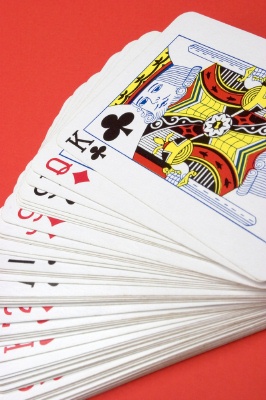|
|
 If you are new to poker, you might be
overwhelmed with the wealth of information and strategies that are offered online, in books and in magazines. While most of this material
might be helpful to you later down the path, it will likely prove to be useless without a solid understanding of a few poker basics. Before
you sit down at a table, it is absolutely essential to grasp the fundamentals that are offered in this article. If you want to learn
basic poker tactics, this is a good place to start. If you are new to poker, you might be
overwhelmed with the wealth of information and strategies that are offered online, in books and in magazines. While most of this material
might be helpful to you later down the path, it will likely prove to be useless without a solid understanding of a few poker basics. Before
you sit down at a table, it is absolutely essential to grasp the fundamentals that are offered in this article. If you want to learn
basic poker tactics, this is a good place to start.
The most elementary and important thing to understand is how a standard 52 card deck works. Within a deck, there are 13 rankings of cards,
each appearing in four different suits. Players use combinations of these cards to create the best poker hand, which is determined by
the game they are playing. Because a winning hand might look differently from one game to the next, it is always important to have a
good understanding of a game before sitting down at a table. While there are several exceptions, the most commonly played poker games
dictate that the pot is awarded to the player who makes the best five card hand. For an in-depth explanation of how these hands are
ranked, check out the poker hands article linked at the left.
Once you have a solid understanding of how a deck of cards works and how poker hands are typically ranked, it is time to start thinking
about what game you want to play. There are a wide variety of games available online and in brick and mortar casinos, including flop
games, stud games and draw. If you tend to like more fast paced action, then playing Hold’em is a good choice; it is easy to learn and
each hand is completed fairly quickly. If you are looking for a more relaxed and slow paced game to start on, then Stud (particularly
Stud Hi/Low) might be a good option. While there are many possibilities when it comes to poker games, the most important consideration
should be which game gives you the biggest edge. At the end of the day, finding a game you can beat will be key to your
success as a player. Check out the "How to Play Poker"
section linked in the left hand navigation for in depth articles of how to play different games and a complete description of poker
rules.
When you start to feel comfortable enough with the poker basics and rules of the game, you should now start to focus on how to play it well.
Anyone can win now and then (which is what makes poker so appealing) but becoming a consistent winner will take some work. The most basic
strategy that a player can implement is to become more selective with what hands they initially enter the pot with. If you watch a
consistent loser play poker, you might notice that they play a large percentage of their starting hands, hoping to “get there” later in
the hand. While they will hit once in a while, this loose style of play will ultimately bleed away money. Playing a tighter game is
especially important for poker beginners, as they will have a much harder time than experienced players when playing mediocre hands on
later streets. Once you become more experienced and start to implement more advanced strategies, you will most likely feel more comfortable
opening up your game in certain situations.
In addition to being selective about what hands you play, game selection should be a major consideration when playing poker. Staying in
the best game will maximize your potential for profit, commonly called
“expected value.” When playing online, try to
find a game that has an average pot size and percentage of players seeing the flop that suits your playing style. For most players
this would mean looking for games with high average pot sizes and a large percentage of players seeing the flop (obviously this applies
to flop games). These numbers are usually listed next to each table in the virtual lobby and will point you in the direction of the juiciest
game. At a live casino, it is always a good idea to keep an eye on the other tables in the room. If your game is filled with tight or tough
opponents, don’t be afraid to ask the floor staff for a table change in search of more action.
Because each poker table you sit at will be unique (in regards to your opponent’s
playing styles), being willing to adapt and adjust your play is
essential to keeping an edge. Popular basic poker strategy says that players should usually try play opposite of their opponents. For
example, if your table is very loose, it is most advantageous to play a tighter game and choose your spots carefully. Conversely, if
your opponents are all playing tight and not entering many pots, it is usually appropriate for you to play more aggressively. By raising
the tight players out of hands, you will claim many pots that no one else seems interested in fighting for.
Now that you have a better grasp of some poker basics, there are many articles on Poker-Vibe that will help you gain an understanding of
more advanced strategies that will improve your game and make poker a more enjoyable (and profitable) experience. |
|









